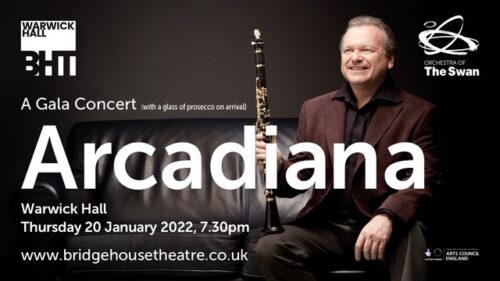 United Kingdom Wagner, Mozart, Schubert: Orchestra of the Swan / Michael Collins (conductor, clarinet). Warwick Hall, Warwick School, 20.1.2022. (CP)
United Kingdom Wagner, Mozart, Schubert: Orchestra of the Swan / Michael Collins (conductor, clarinet). Warwick Hall, Warwick School, 20.1.2022. (CP)

Wagner – Siegfried Idyll, WWV 103
Mozart – Concerto for Clarinet and Orchestra in A major, K622
Schubert – Symphony No.5 in B-flat major, D485
The superbly equipped Warwick Hall, filled to near capacity, hosted the blockbuster pairing of Orchestra of the Swan’s leader, Zoë Beyers, with current Principal Conductor Michael Collins to kick off the orchestra’s residency at Warwick School’s purpose-built concert hall with their gala concert, Arcadiana. Beyers is best known an extremely talented solo performer; many in the audience will remember her stunning performances in Leamington over the last two years of the technically challenging Glazunov Violin Concerto in A, Op.42 and Mendelssohn’s most-loved Violin Concerto in E minor, Op.64.
In the absence of the orchestra’s artistic director and usual leader, David Le Page, Beyers showed great skill in her fully supportive role of Collins and also appeared to be an excellent coach as she lifted the performance of individual string players. This was best demonstrated in her leadership of Wagner’s symphonic poem celebrating the birthday of his second wife, Cosima, and first performed in 1870. Played with a splendid warmth, this work fully deserves the unshowy exuberance captured by this fine chamber group. Exciting expansion plans in 2022 include concerts at Coventry’s recently refurbished Drapers’ Hall and at venues in Hereford, Cheltenham and Pershore.
Local myth insists that audiences in Stratford-upon-Avon will not travel to Warwick and Leamington and vice versa. At last that myth was laid to rest thanks to a successful publicity campaign by an energetic orchestra board and the skilful use of social media outlets. With Stratford strongly represented, close to 280 patrons were present in the hall; one of two remarkable venues on this Warwick Independent Schools Foundation site (The Bridge House Theatre is the other). Partnership building is one of the Foundation’s primary aims with links established with Warwickshire Music to provide opportunities for music education across the county’s schools. In autumn 2021, Warwick established itself as a ‘Singing Town’ designed to promote health and happiness within the community as these infection-ridden times (hopefully) recede.
As the gorgeous dialogue between Diane Clark’s flute and Sally Harrop’s clarinet readies the Siegfried Idyll for its culmination, the ever-alert Beyers anticipates the need for the removal of the conductor’s stand in order to create space for Collins and his basset clarinet to perform and conduct Mozart’s masterpiece, his Concerto for Clarinet and Orchestra. Job done, Beyers returned to her principal role to lead her violin and viola desks.
Michael Collins brings charm, charisma and a remarkable depth of sound to his playing, insisting this work demands the basset with its extra key ‘in an attempt to get to the heart of the work’. Collins uses a strap – when he has one – to support this instrument which is larger and heavier than the soprano clarinet. He had left his at home! Fortunately, one of the bassoon players had a spare.
The uniformly paced opening orchestral passage led to the development section and introducing the soloist with a hint of the Baroque. Mozart dispenses with the traditional cadenza in the Allegro; however he encourages the soloist to improvise with short eingang musings. Mozart permits the work’s only cadenza in the Adagio, some passages exploiting the lowest notes of the basset range with a splendid warmth and depth of sound throughout. The closing Rondo: Allegro with its cheerful refrain provided one of the most dramatic showcases for Collins’s clarinet. His considerable virtuosity and brilliance in passage work was recognised and rewarded by the enthusiastic following; Mozart’s last major instrumental composition seldom fails to enthuse.
Mozart’s influence on Schubert is well recognised; almost an infatuation in 1816, the year Schubert composed his Fifth Symphony. Of all his symphonies this is scored for the smallest orchestra, so well suited to The Orchestra of the Swan, requiring only flute, oboes, bassoons, horns and the excellent strings. The very Mozartian opening Allegro precedes one of Schubert’s loveliest melodies in the violins, evidence of Schubert’s love of songs for voice and piano. In contrast the elegant, sometimes abstracted, second movement (Andante con moto) offers an enticing duet between violins and oboes (Victoria Brawn and Louise Braithwaite) with two bassoons adding reassuring support. Crisp wind playing in the third scherzo-like movement followed an aggressive start before the industrious cello desks sought attention in the last movement (Allegro vivace).
In the programme’s introductory paragraphs, David Le Page remarks on the importance of orchestras needing to educate and engage in order to become an indispensable part of the community. A return to Warwick for this superb pairing is most likely.
Clive Peacock
